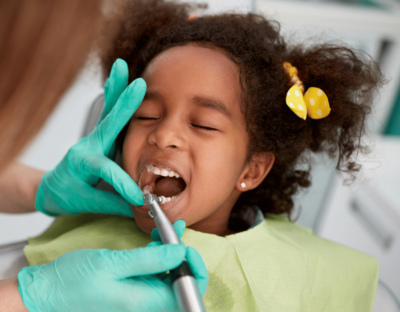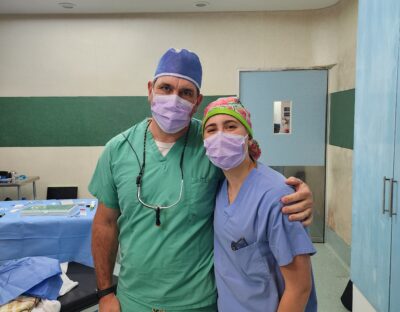A Dental Visit Guide for Children with Autism & Sensory Issues
Dental visits for children with autism spectrum disorder (ASD) or individual sensory issues can often include a lot of new sights, sounds, smells, and sensations. Making regular trips to the dentist is an incredibly important part of building a good oral health program for children. Here are some tips for helping children with autism maintain oral health habits and prepare for what to expect at your child’s first visit to the dentist.
Dental Visits for Children with Autism or Sensory Issues
If you have a child with autism or sensory issues, brushing their teeth may be helpful in providing a calming effect. In order to ensure that all teeth are cleaned properly, consider the use of a rotating or electric toothbrush to provide additional stimulation. Parents can also sing a song like “This is the Way We Brush Our Teeth” (Set to the tune of “Here We Go ‘Round the Mulberry Bush”) to make sure their child spends enough time brushing their teeth.
For children that are sensory avoiders, reluctance maybe because of the taste of the toothpaste, the sensation in and around their mouth, or a combination of factors. There are a variety of unflavored kinds of toothpaste that may be helpful for children where taste is the primary objection.
Toothbrushing Tolerance for Sensory Avoiders
Dental visits for children with autism and special needs are important to have every six months, but healthy habits start at home! Regular brushing is essential to maintaining a child’s oral health, but some autistic children and those with unique sensory challenges may experience some difficulties in doing so. Most children require a parent’s assistance in brushing their teeth until they are a bit older. To help your child become more comfortable in brushing their teeth or having their teeth brushed, consider a gradual approach in assisting them. You can move on to each step in the routine once your child feels comfortable with the previous step. Dentists recommend that all children should be actively supervised when brushing their teeth up until the age of 7-8 years of age. Here are some tips to help make brushing your child’s teeth a little easier:
- Start by applying gentle pressure to the back of their head for a period of five seconds, repeating three times. Do this three to five times per day, preferably where your child will be brushing their teeth. This will help them become accustomed to the feelings they’ll experience during dental appointments and daily brushing.
- While most people brush their teeth in their bathroom, you may choose to perform the activity in another area of the home where your child feels more comfortable. If you’re assisting your child in brushing, it is easier to have them lie down in your lap or lie back in a chair, much like we do during their dental appointment. Children are more likely to remain still since they are more comfortable.
- Once your child is comfortable with pressure on the back of their head, you can begin to extend the routine by applying pressure to other areas of the head and face, such as below the ear and lower cheekbone, applying deep sweeping motions from the ear to the chin with your hands.
- Apply pressure to the lower and upper lip and upper cheekbones with your hands.
- Repeat the above pressure routine using a warm washcloth instead of your hands, encouraging your child to allow you to touch their teeth with the washcloth.
- You can begin to introduce a soft-bristled toothbrush without any toothpaste once your child is comfortable with the washcloth touching their teeth.
- Once your child is ready for toothpaste, use a pea-sized amount.
It may also be helpful to show your child how you brush your teeth, or brush along with them. It’s important to remember that every child, regardless of ASD or sensory processing issues, will have his or her own timeline for mastering each skill and feeling comfortable brushing their teeth on their own.
Preparing for Your Child’s Dental Visit
Preparing children with autism for their trip to the dentist well in advance can be very helpful in easing anxiety and having a calm and successful visit. Be sure to discuss your child’s individual needs, concerns, or challenges with the dentist or staff before the appointment. Talking your child through what to expect when they go to the dentist also helps prepare them and makes them feel more at ease when they come in to see us.
With proper practice and preparation, regular dental visits for children with an autism spectrum disorder, sensory issues, or general anxiety, does not have to be a stressful or anxious event. Dentistry for Children welcomes families of autistic children and those with special needs. Our pediatric dentists and staff are specially trained to work with children and accommodate those with special needs. You’ll find that we strive to make every visit to the dentist and fun and enjoyable experience for every child, every time.
References:
- https://www.mouthhealthy.org/en/kids-brushing-playlist
- https://www.dentalcare.com/en-us/professional-education/ce-courses/ce402/visual-schedules
- https://www.autismspeaks.org/tool-kit/dental-tool-kit
- https://adayinourshoes.com/wp-content/uploads/2013/02/Improving-Sensory-Tolerance-for-Brushing-Teeth.pdf
Ready to get your child’s smile on track?
Serving Lots of Happy Patients
"I’ve been going to Pediatric Dental Associates since I was a child, now I take all 3 of my children there. Great office! Love Dr. Sara, and the my two favorite hygienist…" Read More
"My daughter has special needs & going to the dentist is very difficult for her. Every time she goes she is treated with great care & her needs are always remembered and…" Read More
"How many people can say that their children love going to the dentist? I'm not sure of the stats, but I can raise my hand. From the front desk staff to the…" Read More




